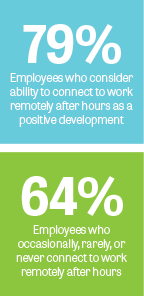TD Magazine Article
Technology Threatens Work-Life Balance, But Most Employees Say That's OK
A recent survey found that 79 percent of employees said that they consider the ability to stay connected to work when away from the office as a positive development.
Fri Aug 08 2014

While maintaining a proper work-life balance is important to most employees, few are upset about the fact that technology can allow work obligations to encroach on their personal lives. In a recent survey by Gallup, 79 percent of employees said that they consider the ability to work remotely outside of normal business hours—using a computer or other electronic device—as a positive development.
However, far fewer employees said that they regularly connect to work after hours: 36 percent said that they frequently do (and spend, on average, nearly 10 hours a week working remotely), while 64 percent said that they occasionally, rarely, or never do (and spend, on average, nearly four hours a week working remotely). The percentage of those who often work remotely after hours nearly matched the 33 percent of respondents who said that their employers expect them to be available remotely after the business day ends.
Of those who frequently check email while away from work, 86 percent said that it is a positive development to be able to do so. (And of the respondents who are required by their employers to be available remotely after hours, 81 percent say that this is a positive development.)
The survey also found that men and younger employees are slightly more likely to work remotely outside of normal business hours: 40 percent of men do so, compared with 31 percent of women; and 38 percent of Millennials do so, compared with 37 percent of Generation X employees and 33 percent of Baby Boomers. The difference is starker in those with a college degree and those with higher earnings, who are more than twice as likely to work remotely than those without college degrees or who earn less money.
The ubiquity of computers, smartphones, and tablets no doubt makes American employees more likely to connect to work online after hours. For many, the ability to keep an eye on email from anywhere means they can avoid putting in late hours at the office.
